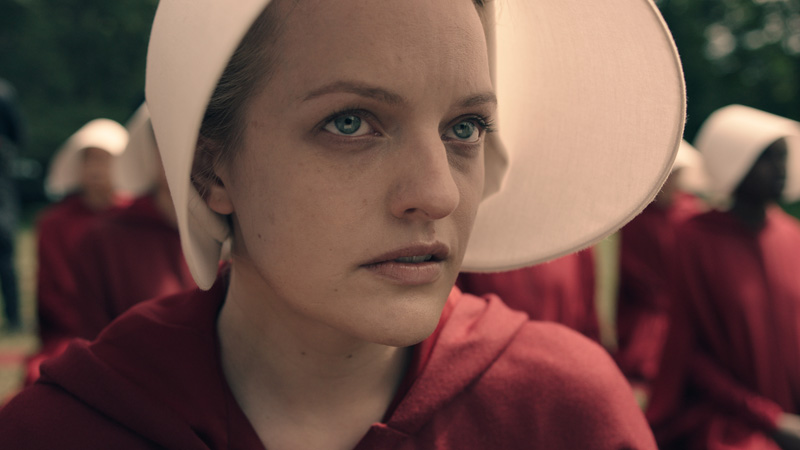Margaret Atwood is in an odd position: As our politics get worse, her stature grows. Right now, sadly (for us), she’s never towered higher.
Appropriate that on International Women’s Day and the A Day Without a Woman protests, the The Handmaid’s Tale novelist conducted a Reddit Ask Me Anything to coincide with the soon-to-premiere Hulu version of her most famous work. Dystopia, feminism and literature are, of course, among the discussion topics. A few exchanges follow.
Question:
Thank you so much for writing The Handmaid’s Tale. It was the book that got me hooked on dystopian novels. What was your inspiration for the story?
Margaret Atwood:
Ooo, three main things: 1) What some people said they would do re: women if they had the power (they have it now and they are); 2) 17th C Puritan New England, plus history through the ages — nothing in the book that didn’t happen, somewhere and 3) the dystopian spec fics of my youth, such as 1984, Ray Bradbury’s Fahrenheit 451, etc. I wanted to see if I could write one of those, too.
Question:
Question:
What is a book you keep going back to read and why?
Margaret Atwood:
This is going to sound corny but Shakespeare is my return read. He knew so much about human nature (+ and minus) and also was an amazing experimenter with language. But there are many other favourites. Wuthering Heights recently. In moments of crisis I go back to (don’t laugh) Lord of the Rings, b/c despite the EVIL EYE OF MORDOR it comes out all right in the end. Whew.
Question:
How, if at all, has your feminism changed over the last decade or so? Can you see these changes taking place throughout your literature? Lastly, can you offer any advice for feminists of the millennial generation? What mistakes are we making/repeating? What are our priorities in this political climate?
Margaret Atwood:
Hello: I am so shrieking old that my formative years (the 40s and 50s) took place before 2nd wave late-60’s feminist/women’s movement. But since I grew up largely in the backwoods and had strong female relatives and parents who read a lot and never told me I couldn’t do such and such because of being a girl, I avoided the agit-prop of the 50s that said women should be in bungalows with washing machines to make room for men coming back from the war. So I was always just very puzzled by some of the stuff said and done by/around women. I was probably a danger to myself and others! (joke) My interest was in women of all kinds — and they are of all kinds. They are interesting in and of themselves, and they do not always behave well. But then I learned more about things like laws and other parts of the world, and history… try Marilyn French’s From Eve to Dawn, pretty massive. We are now in what is being called the 3rd wave — seeing a lot of pushback against women, and also a lot of women pushing back in their turn. I’d say in general: be informed, be aware. The priorities in the US are roughly trying to prevent the roll-back that is taking place especially in the area of women’s health. Who knew that this would ever have to be defended? Childbirth care, pre-natal care, early childhood care — many people will not even be able to afford any of it. Dead bodies on the floor will result. It is frightful. Then there is the whole issue of sexual violence being used as control — it is such an old motif. For a theory of why now, see Eve’s Seed. It’s an unsettled time. If I were a younger woman I’d be taking a self-defense course. I did once take Judo, in the days of the Boston Strangler, but it was very lady-like then and I don’t think it would have availed. There’s something called Wen-Do. It’s good, I am told.
Question:
The Handmaid’s Tale gets thrown out as your current worst-case scenario right now but I read The Heart Goes Last a few months ago and I was surprised how possible it felt. Was there a specific news story or event that compelled you to write that particular story?
Margaret Atwood:
The Heart Goes Last — yes, came from my interest in what happens when a region’s economy collapses and people are really up against it, and the only “business” in which people can have jobs is a prison. It pushes the envelope (will there really be some Elvis robots?) but again, much of what was only speculation then is increasingly possible.
Question:
How did your experience with the 2017 version differ from the 1990 version of The Handmaid’s Tale?
Margaret Atwood:
Different times (that world is closer now!) and a 90 minute film is a different proposition from a 10 part 1st season series, which can build out and deep dive because it has more time. The advent of high-quality streamed or televised series has opened up a whole new set of possibilities for longer novels. We launched the 1990 film in West and then East Berlin just as the Wall was coming down… and I started writing book when the Wall was still there… Framed it in people’s minds in a different way. Also, then, many people were saying “It can’t happen here.” Now, not so much….•
Tags: Margaret Atwood

